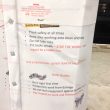
I’ve had enough of obscure business writing that seems intent on obfuscating the real meaning. Words that are thrown in without thought for context; weasel words that are used to dilute the intention and break promises before they’ve even been made.
Business writing may demand a different focus to other writing styles, but that doesn’t mean the reader should have a business degree and a copy of your Year End Results in order to understand your little article.
As always, I ask everyone to say what you mean and mean what you say. If you find that you’ve written a convoluted sentence, don’t just play around with the vocabulary, re-write the whole thing. Break up your points into different sentences and break up your subjects into separate paragraphs. Try re-arranging the order of your points, if that helps.
Words and phrases to dump
(or at least take care when using.)
‘Going forward‘. Unless you work for a Temporal Displacement company, we don’t travel back in time much. Dump this tautological phrase.
‘Ensure‘ – yes yes, we ‘ensure’ that everything will go to plan, we ‘ensure’ this and ‘ensure’ that. All well and good, but don’t over use the word, it makes you sound daft.
‘Engagement‘ – yes, it’s a big word in Internal Communications and HR, but don’t use it without defining what it means for your company, and what it means in this particular context. Read without understanding, it’s a nonsense word.
‘We are pleased to announce‘ – no you’re not. If you were actually so pleased, you wouldn’t start your article with such a trite phrase; you’d be brimming over with enthusiasm! Dump this tired tripe.
‘Further to my previous…’ – to you previous what? Sorry, but we’ve all moved on since your previous message; just give us a synopsis of whatever you’re on about, never forget to give us context.
Rambling stock phrases destroy your unique voice – just say what you mean and mean what you say in your own words and your audience will be more inclined to understand and trust you.
Bare bones of good writing:
- accurate;
- relevant;
- timely;
- concise;
- contextual;
- rich.
There are so many business words that are losing their real sense; what other words and phrases should we avoid if we want to be heard properly?
[Wedge][Image Credit: Jesper by Niklas]





I am pleased to announce … I love this post. Thank you.
This problem is almost as bad in academia as it is in business. I have administrators who can write two pages of copy and still say almost nothing. It’s like mining for nuggets of useful information.
I can’t tell you how often I’m presented with something like: “We are in the beginning stages of planning a series of meetings to discuss the desired paradigm shift and the ensuing potential for changing our processes to enhance the blah blah blah…”
Ahhhhh. By that point, you’ve lost all but your most dedicated readers … and their brains are melting.
Of course, when I edit such things to relevant, concise, straight-forward statements, they look at me like I’ve just kicked their cat.
But, hey, that’s why editors get the big bucks, eh? Er, uh. Hmmmm. Maybe not.
As for more words and phrases to ban, can I just add “unnecessary jargon and acronyms” to the list?
Yes, there is a time and place for them. But, unless your target audience is a group of fellow industry professionals, it does your reader no good to fill your copy with industry-speak and alphabet soup. It’s intimidating and counter-productive.
Wow. Guess I had a bit to say on this subject. I hope you don’t mind. You inspired me. :)
Oh Zen, your comment is better than my hastily written post!
I promise to deal with acronyms very soon, I know something about acronyms that few other people know, so I hope to share soon :)
*blush*
Oh, Wedge, this is a wonderful post!
I’m a technical writer, and one of my pet peeves is reading meaningless strings of what appears to be English words in an online help system, or a software training manual. Egads! I have a hard time understanding how any writer, much less any editor or documentation project manager, would allow such drivel to appear in a place that cries out for practical, concise, descriptive language.
I have a couple resources you might like. David Meerman Scott wrote an ebook called the Gobbldeygook Manifesto about exactly such things (http://tinyurl.com/cod6xt). And David Pogue of the New York Times wrote up his own list of forbidden words, which I addressed in my recent blog post (http://tinyurl.com/3s5375).
I love that you are an evangelist for good, clear, simple language! That’s a cause I can totally get behind.
The word “space” drives me nuts, as in, “We plan to invest in the enterprise 2.0 space.” The what? You mean, you plan to invest in a company that sells e2.0 tools, or you want to buy e2.0 tools to use them? I don’t know where “space” came from, but it’s become completely integrated into speech and I can’t stand it.